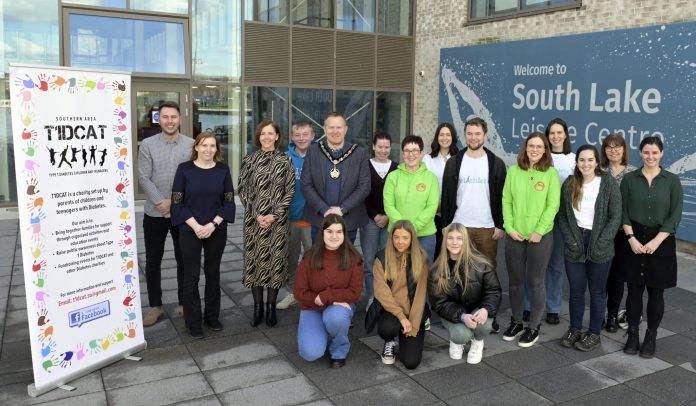
A brand new clinic for children and young people with Type 1 Diabetes (T1D) has been trialled over the last few months at South Lake Leisure Centre (SLLC).
Organised by Armagh City, Banbridge and Craigavon Borough Council in partnership with the Southern Health and Social Care Trust (SHSCT) T1D team, a number of age banded group clinics were held in SLLC instead of a hospital setting.
Diathlete Gavin Griffiths – an ultra-endurance athlete who was diagnosed with T1D at eight years old and now educates and encourages young people with the condition – ran inspirational group sessions with the young people and parents/carers, along with his colleagues from the League of Diabetes and members of the SHSCT T1D team.
Officers from the Sports Development department of council also ran activity sessions, while staff at SLLC offered a tour of the facilities.
“This pilot programme has been a fantastic success and we have already had some brilliant feedback from the young people who attended and their parents,” commented the Lord Mayor of Armagh, Banbridge and Craigavon Councillor Paul Greenfield.
“The idea was to bring patients and families together outside of a hospital setting to a more informal, fun venue, to offer some peer support, a chance to get to know each other and some activities and talks that everyone would find interesting and helpful. A huge well done to everyone involved in bringing such a pioneering idea to life.”
T1D is an autoimmune condition. It is not known what causes T1D, but it is not linked to lifestyle choices and cannot be prevented. In T1D the body’s own immune system attacks cells in the pancreas which produce insulin.
People living with T1D diabetes have to check their blood glucose levels and take insulin via injection or an insulin pump multiple times per day to stay alive. They have to count carbohydrate in foods they are eating and work out how much insulin to give. Exercise, stress, sickness and even simply growing to name but a few, all affect blood glucose levels.
“T1D is a relentless condition. People living with T1D don’t get any days off because it has to be managed 24/7,” said Dr Sarinda Millar, Consultant Paediatrician and lead for T1D service in SHSCT.
“At each session we had Diabetes Specialist Nurses, Diabetes Specialist Dietitians and Doctors (from both Paediatric and Adult T1D teams where applicable) present as well as members from the SHSCT psychology team.
“For the older age groups podiatrists from SHSCT and representatives from the Regional retinal screening program attended so the young people could have their annual checks done on the same day.
“With some educational and informative talks on T1D management including sick day rules and hypoglycaemia management, information on insulin pumps/continuous glucose monitoring systems, DUK, JDRF and support from T1DCAT, the Trust’s Charity, the sessions really were a great success!”
It is hoped that more of these clinics will run in the future.
They key signs and symptoms of diabetes are the four ‘T’s:
- Thirst – drinking a lot
- Toilet – passing urine more than usual
- Thinner – losing weight
- Tired- not as much energy as usual.
If you or anyone you know is experiencing any of these symptoms, please contact your GP as soon as possible.







